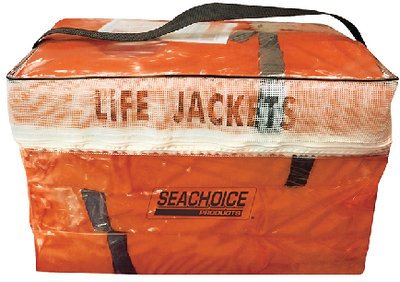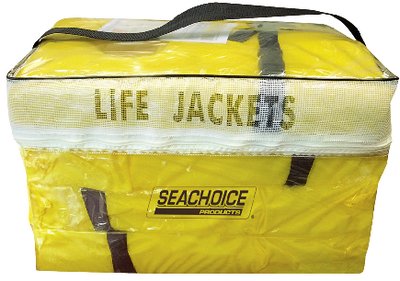Boat ditch bags, boat gear bags, and boat safety kits are essential boating safety equipment to ensure that you’re prepared for emergencies when out on the water. PartsVu is proud to carry a complete selection of these boating safety products from leading boating product suppliers, like Seachoice, Full Throttle, and others.
SEACHOICE
Seachoice - Type II Life Vest 4-Pack with Bag - Adult - Orange - 85510
$75.57Unit price /UnavailableSEACHOICE
Seachoice - Type II Life Vest 4-Pack with Bag - Adult - Yellow - 86010
$75.57Unit price /UnavailableACR Electronics
ACR RapidDitch Express Abandon Ship Bag - 2279
$81.90$104.95Unit price /UnavailableWOW WATERSPORTS
WOW Watersports H2O Proof Dry Bag - Clear 30 Liter - 18-5090C
$29.31$29.99Unit price /UnavailableRonstan
Ronstan Dry Roll Top - 55L Crew Bag - Black & Grey - RF4015
$126.66Unit price /UnavailableKent Sporting Goods
Kent 4-Pack of Adult Type II Vests in Stowage Bag - 102200-200-004-12
$96.59Unit price /Unavailable
Ditch Bags for Boats, Gear Bags for Boats, and Safety Kits for Boats Resources and Information
Boat Ditch bags contain essential items and food to help you survive in a life raft until you’re rescued. Gear bags are waterproof bags in which you store your valuables and electronics to keep them safe and dry on your boat. Boat safety kits contain essential boating safety accessories like flashlights and rope, that can be utilized in case of an emergency. PartsVu stocks boating products from top brands, like Seachoice, Full Throttle, and others.
Looking for more boating and marine products? Check out our complete selection of Products and Accessories or shop our broader categories of Boating Accessories and Boating Safety Equipment and Boat Safety Equipment, Lifejackets, & Personal Floatation Devices.
Boat Ditch Bags, Boat Gear Bags, and Boat Safety Kits FAQs
Can I use any type of duffle bag for a ditch bag?
A ditch bag must contain the items needed to call for help and to survive in a life raft while waiting for rescue. A ditch bag must be kept in an accessible location on board, ready for immediate removal should the need arise.
We recommend against trying to adapt a duffel bag or using a dry bag. Rather, we advise using bags specifically designed for abandon-ship/survival situations. What features should your ditch bag have? Floatation, water resistance, bright colors for visibility, carrying straps, and tethers for sure. Additionally, we suggest looking for a bag with well-designed dividers so you can organize your gear. Finally, the bag must be large enough to contain survival gear plus food and water for you and all others on board.
What are some boating safety items I should keep in my boat in case of emergencies?
Sea Anchors
Used to stabilize a boat in heavy weather, a sea anchor is a must for offshore boaters. Rather than tethering the boat to the seabed, the sea anchor increases drag through the water and serves as a brake. When attached to the stern, a sea anchor can prevent the vessel from turning broadside to the waves and being overwhelmed by them. Additionally, sea anchors help to hold position and avoid crashing into rocks or other obstacles while waiting for help in a rescue situation.
Life Raft
A life raft is designed to keep the passengers of a sunk, capsized, or burned boat alive until they can be rescued. Although every offshore boater hopes to never need their life raft, it is the most important piece of equipment aboard. Life rafts leave the passengers aboard little protection from the elements but are designed for visibility to aid with rescue efforts. Although much-needed safety devices, they should only be used as a last resort. Whenever possible, it is safer to stay aboard your main vessel even if it is damaged.
Full Selection of Viking Life Rafts
Rope
Plenty of heavy rope is a must if you need to use your sea anchor or if you need to be towed.
Emergency Food and Water
Suitable food and water rations must be included in your ditch bag. Additionally, these supplies must accommodate the number of passengers on board.
Emergency Boat Plugs and/or Emergency Sealant
These should be carried onboard to plug leaks and avoid taking on water when offshore.
What is a float plan?
If you are going for just a few hours on your boat, let someone know where you expect to be and when you expect to return. If you plan a longer cruise, leave a written float plan with your marina or a friend. A float plan should include a description of your boat, who is on board, the safety equipment you are carrying, where you expect to be, and when you expect to be there.
Instruct the person holding the float plan to notify the Coast Guard or other appropriate agency if you do not return within a reasonable time after your scheduled arrival (taking into account weather, etc.). When you arrive at your destination, or if your plans change, notify the person holding your float plan to avoid unnecessary worry and the possible waste of search-and-rescue resources. Float plans are not filed with the Coast Guard but that agency and other rescue authorities use them if needed. No special form or format is required for a float plan, but the Coast Guard Auxiliary offers a PDF that can be used as a guide.
As mentioned earlier in this post, our “Essential Guide to Boating Safety: Knowledge, Gear & Technologies” article discusses many safety issues that are universal to all boaters. Topics not included within this article to avoid repetition include:
- Visual distress signals
- Fire extinguishers
- GPS navigation devices
- Compasses
- Searchlights
- Navigation lights
- Anchors
- Anchor lights
- Throwables
- Engine cut-off switch lanyards
- First-aid kits
Why should boaters follow safety regulations?
Boating on various waterways is similar to automobiles out on the roads and highways—safety devices are designed to keep people safe. Thousands of accidents occur, many of which have a high probability of injury and a substantial number of cases resulting in death.
Specifically, in 2020 the Coast Guard counted 5,265 recreational boating accidents resulting in 767 deaths, 3,191 injuries, and approximately $62.5 million of property damage. Where the cause of death was known, 75% of fatal boating accident victims drowned. Of those drowning victims with reported life jacket usage, 86% were not wearing a life jacket.
Since most accidents occur unexpectedly, there may not be sufficient time to put on a life jacket, especially when stowed away in a locker. In cases where a person is thrown overboard, it is harder than you think to get them back on board, which can be assisted with proper equipment. Always be sure personal floatation devices (PFDs) are in good and serviceable condition. For extra protection, equip your PFDs with a whistle and emergency light.
What other boat safety equipment should I have on hand?
When out on the water, the only items you have are the ones you bring. People often forget about the possibility of minor injuries, but some additional preparedness will have you ready for anything.
- Bring a first aid kit along for all outings. This is especially important when fishing.
- Since the sun reflects off the water, it is wise to consistently apply proper sun protection to make sure you don’t get burned. Sun protective clothing is a smart choice— it provides all-day protection that doesn’t need reapplying. Pro-tip: some sunscreen is toxic for the marine environment and repels fish, who can smell even trace amounts on bait. For any part of your body not covered by UPF clothing, use a sunscreen that’s both reef-safe and fish-friendly.
- While some boats are simply too large for this to be practical, carrying a paddle or two on board is a good idea in many cases. Even if you can’t paddle all the way back to a marina or dock when your engine goes, you may be able to reach the closest bit of land and wait for help. A good anchor with enough chain will also be helpful.
- We’ve written extensively on the importance of a VHF radio, but it simply can’t be overstated. Cell phones aren’t enough in many areas, and you’ll be glad to have the security.
- Be alert to changing conditions on the water and aware of weather that can change quickly. The danger of boating in a storm is no joke!
- Finally, bring plenty of drinking water for everyone on board to stay hydrated. In the face of unexpected problems, you don’t want to be caught stuck on your boat with an insufficient water supply.
























